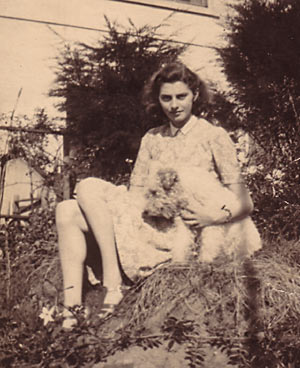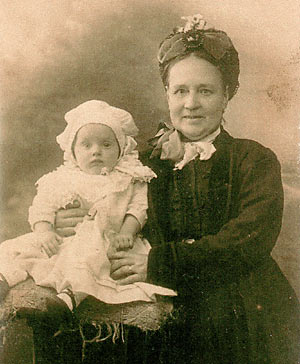
Exeter Stories
Exeter folk and friends in their own words - 1890's to the 1990's │ << Previous story │ Next story >> │
Olive Johnson nee Nibbs - surviving the war
I remember so well when war was declared. My parents, having already lived, through the First World War, were quiet for once, apparently thinking what had to be done to make life for their whole family a little better than their first experience. They immediately realised that their first duty would be to accommodate any of their London family who may have need to leave the Capital, if the expected air-raids became as frequent and heavy as threatened.
The family pulls together
My sister, then living in Plymouth with her husband and her daughter, had decided that Plymouth would be a target, so they packed all their furniture and personal possessions into Popham's depository and moved in with us in Whiteway Drive. Quite soon another toddler, my cousin Ron's daughter, Helen, was another charge, closely followed by Aunt Nell and her grandson, Brian. We were beginning to get squeezed, when Mum opened the front door to another visitor, standing there in her little black bonnet with all her worldly possessions in a little suitcase ... my Dad's mother! "Hello Pollie!" she greeted my amazed mother, "Them Jerries ain't goin to git me!" - and in she came! She would have been quite 92 years of age! It was 'all go' and we began to find odd places to sleep at home ... our lounge, which was quite roomy, sometimes accommodated six or more people, sleeping on mattresses on the floor! Somehow, no-one seemed concerned about this!
Evacuees and shelters
I am not too sure exactly when the first London Evacuees came to our house, but when asked if we could take some, we only had an Anderson Shelter in the garden, but on agreeing to take as many boys as were allowed, Mum got seven shillings and sixpence for each of them!, a Morrison Shelter was delivered to us for erection in our dining room. A huge thing, taking up a lot of the space and with nasty nuts protruding along the upper edge of the table, which even though we tried to use it as a family meal table, was the reason for many a cup of tea coming to grief even before it had been tasted! This steel table top was supported on heavy steel struts to a similar base, where a double mattress could be laid and quite a number of boys could occupy it during an air-raid. Many a life has been saved by these tables.
Very quickly we were infiltrated by schoolboys, mostly having been enrolled in Heles School the moment they arrived in Exeter. Our quiet suburban lives were immediately shattered! They ate like vultures and my Mum never seemed to be free of washing and ironing shirts during the years they were living with us. One teenager called Sam used to don a clean shirt each evening, until Mum decided that he would really have to make do with the clean shirt he had worn that morning! Undoubtedly, some sacrifices had to be made, as my Mum was not only caring for this additional brood, but was a serving St. John nurse, which took a lot of her time. I sometimes wonder how on earth she managed to do as much as she did!
Dad of course, was too old to serve in the forces, so he became the Air Raid Warden for the street and was given a black helmet to prove this! With a houseful of people, he thought carefully about the difficulty likely to be presented should a really bad air raid hit Exeter. Hardly likely, everyone felt, as there was little in the City to warrant a detour from the raids on the large towns.
Digging for shelter
Toddlers and the boy evacuees would not particularly enjoy the experience of an air raid, so Dad had the idea that we would all be much safer if we were below ground sheltering. After a survey of the house, he decided that a dugout under the kitchen would be the safest place. Without hesitation, he lifted the linoleum flooring and neatly sawed out an oblong opening, large enough for a good sized adult to pass through and began to dig a hole in the red Devon soil, low enough to accommodate a wooden step ladder. At the rear of the house, the gap was about 3 to 4 feet, so digging another 3 feet gave quite good headroom. Having started this excavation, he hinged the braced cut-out floor boards and fixed a support around the hole, covering the lid with lino, so that it could close neatly when not in use as the entrance to the shelter. He then said, "Here are buckets and shovels ... get digging!" We did and thoroughly enjoyed ourselves, heaving the surplus soil up through the trap-door. We used the same technique we used at Dawlish Warren on the beach - only this time it was an oblong, with bench seating carved out of the soil to surround it! Dad then extended the electric wiring and a permanent light was fitted. Now, when the sirens wailed out their signals to take shelter, we had a rip-roaring time picnicking with all the stored equipment, crockery, utensils and electric kettles and emergency primus stoves to give us all the comfort we needed. We even had an electric fire down there. We managed to make a serious situation more tolerable than we had ever expected previously. We now had shelter both outside in the garden, inside the dining room and now under the kitchen.
We were all very satisfied .... apart from Grandma Nibbs, now around 94/95 who stood firm ... "There is NO way that you are goin to git me down them steps !" she swore! ... So, there she sat, in solitary glory in her little chair, by the open hatch, conversing with us all and sharing the cups of tea, but BUDGE she would not!
Although we had several occasions when a bomb had exploded close enough to blow down all our blackout frames, we kept the windows open during a raid, to save the possibility of breaking glass causing more damage, we only had a rather bad cracked wall materialise in our bathroom, after an unexploded bomb was removed from a nearby house just off the Hamlin Lane ... we were warned that it was to be exploded in the cavity of a stream which ran alongside the field at the back of our home, down as far as Polsloe Bridge, but has since been conduited completely. This really rocked the house when it went off!
Blown off the road
Another incident occurred one evening when my Dad and I were cycling back from Kenford. I can't remember why Dad was with me on this occasion, but my sister, Sylvia taught at the village school at Kenford and I fancy it may have been connected with one of the handicraft lessons which she gave after school hours once a week, that apparently needed us to be there. I don't now remember the route we took, but I do know that we were about to freewheel down the main street in Heavitree, and had just arrived at Mont le Grand, or more precisely by the Gordon Lamp in the centre of the forked roads leading to Heavitree's main street.
It was dark and of course, the normal blackout regulations were observed, in fact our bicycle lamps, poor enough with the full glassed light, had only a small slit allowed in a black tin covering, so we were positively cycling using a Braille system! Suddenly, we were both in a hedge on the right-hand side of the road - I had no idea how I got there, neither had my Dad, but a terrific flash from the lower part of the road told us that it had been an explosion, though we had heard no aircraft all the way from Kenford. We got home as fast as we could and wondered what had been the cause. We learned the following day that it had been a parachuted land-mine which had exploded somewhere in the area of St Loyes.
A man working at Standfield & White's my Dad's workplace, had not been at home at the time, but when he returned, his home had gone, completely! The whole family had been elsewhere on this evening. That was enough to cause a ripple of interest, but more than this was the fact that this man had brought with him, to the garage, a lovely little stemmed wineglass ... a souvenier of all he had from his home ... but the strangest thing of all was that this wine-glass, with the rest of the half-dozen set, had always been kept within the doors of their sideboard in the living room. Completely undamaged, it had been found amongst the rubble as he searched for anything which had been left of his home!
© 2006 Olive Johnson - David Cornforth
Olive Johnson nee Nibbs was born and brought up in Exeter. Her father was employed at Standfield and White, in Sidwell Street. The family lived in Weirfield Road in 1920. She married in 1942 and moved away from the city. In these extracts from her emails, she remembers the Exeter blitz.
 Olive sitting on the family's Anderson shelter.
Olive sitting on the family's Anderson shelter.
 Grandma Nibbs and Olive's sister, Sylvia in 1914
Grandma Nibbs and Olive's sister, Sylvia in 1914
│ Top of Page │